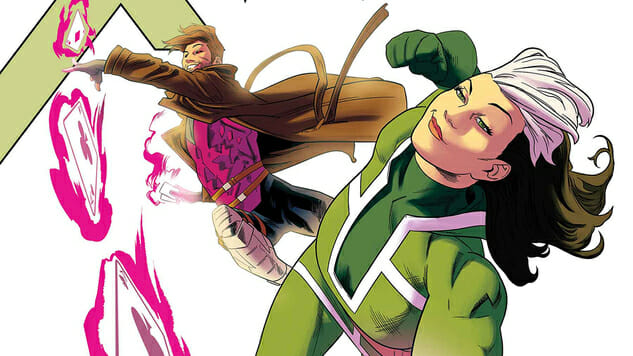Good Riddance to the “Stealth Mini-Series,” One of Marvel’s Worst Sales Tactics
Main Art by Kris Anka
One comic debut this week should interest readers beyond the super-heroic action (and romance!) contained within its covers: Marvel’s Rogue & Gambit, written by Kelly Thompson with art by Pere Perez, is a limited series, scheduled to run five issues. While the sheer existence of a mini-series from Marvel Comics shouldn’t feel particularly revelatory in 2018, this title and a handful of others give industry observers a reason to suspect—and hope—that the era of the “stealth mini-series” is dead and buried.
For readers unfamiliar with the term, “stealth mini-series” was coined some time during the last few years of near-constant line-wide initiatives at Marvel to describes books launched, marketed and sold as ongoing series but cancelled within one arc. Titles like Red Wolf, Starbrand & Nightmask, Black Knight, Nick Fury and David F. Walker and Ramon Villalobos’ fan-favorite Nighthawk all fit the description, as does the much-discussed premature death of Ta-Nehesi Coates, Yona Harvey and Butch Guice’s Black Panther & The Crew, which ran for one fewer issue than the original infamously cancelled The Crew.

Black Panther & The Crew #6 Cover Art by John Cassaday
Beginning around 2015, the only comics Marvel launched as limited series were event comics, event tie-ins and Star Wars comics, a brand that (so far) seems mostly impervious to downward sales trends. Senior Vice President of Sales and Marketing David Gabriel explained the publisher’s reasoning in a candid interview with ICv2 last March (the same interview in which he discussed the sales impact of “diversity” in one of Marvel’s most public 2017 blunders):
“I’m going to tell you, the limited series is the death knell,” Gabriel said of the current market environment. “The only place that it hasn’t been a death knell, which is amazing, is on the Star Wars stuff. Anytime we’ve called something a limited series, it did not hurt the sales at all. You call anything else in the Marvel Universe a limited series, it’s dead on arrival.”
Understanding Gabriel’s comments requires a wider explanation of how comics are sold within the direct market. Under the current ordering system, comic shops commit to (mostly un-returnable) orders several months in advance, which provides the bulk of the sales data that publishers use to determine series viability. This is why even the most prominent creators, like Runaways writer and YA megastar Rainbow Rowell, must continuously explain to their readers how to order comics in advance at brick-and-mortar comic retailers. Day-of sales when a comic hits shelves, digital sales and eventual trade-collection sales provide later waves of data for publishers, and few books receive the disproportionate back-end bump required to survive low single-issue preorders. (In fairness, some certainly do, including Ms. Marvel and The Unbeatable Squirrel Girl, but publishers are notoriously cagey about discussing non-direct-market sales.)
-

-

-

-

-

-

-

-

-

-

-

-

-

-

-

-

-

-

-

-

-

-

-

-

-

-

-

-

-

-

-

-

-

-

-

-

-

-

-

-











































